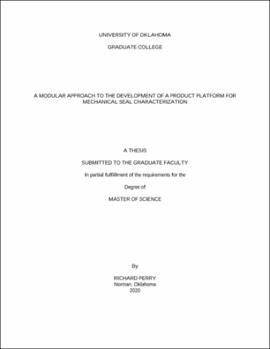| dc.contributor.advisor | Siddique, Zahed | |
| dc.contributor.author | Perry, Richard | |
| dc.date.accessioned | 2020-07-16T15:24:46Z | |
| dc.date.available | 2020-07-16T15:24:46Z | |
| dc.date.issued | 2020-07 | |
| dc.identifier.uri | https://hdl.handle.net/11244/325267 | |
| dc.description.abstract | Sealing technology is critical for all industries – especially in the oil and gas industry. This technology can be broadly defined as the ability to prevent unwanted material from freely flowing into a reservoir. This is critical in extending the life of rotating dynamic systems such as bearings found in compressor or pumps. The oil and gas industry must maintain rotating equipment for several critical applications during drilling and production. Since many of the fluids in this field can be flammable or toxic, the ability to consistently limit the movement of this media in dynamic applications is not only critical for extending the life of equipment, but also the operators. Polymers are cost effective and often used in dynamics applications, but harsh environmental conditions related to surface speed or temperature can limit their application. This limitation found in the dynamic application of polymers has created a demand for the development of mechanical seals.
Mechanical seals are the topic of this thesis. Even with the advent of modern engineering simulation software, experimental evaluation of mechanical sealing technology is still critical. Since materials are in a constant state of development, familiar standards such as API or ASME cannot keep up with industry demand. It is the lack of standardization that creates the need for mechanical seal characterization equipment. Since mechanical seals are used in a wide range of applications, the ability to create a family of products that can characterize a variety of rotary seals can be beneficial.
This thesis will attempt to address the following research questions:
RQ1: How to develop a modular product platform for rapid deployment of equipment for mechanical seal characterization?
RQ2: How does modular and physical commonality relate to each other using a platform approach for characterization of mechanical seals?
These questions were addressed through the development of a modular product platform and the fabrication of the family of products while taking advantage of commonalities found in the product platform development. Addressing modular commonalities can prevent a duplication of efforts and provide economy of scale in the design and manufacture throughout the life of this family of products.
In this thesis two systems are designed for mechanical seal characterization using a product family approach. After the family members are fabricated, the systems will be commissioned to demonstrate an ability to characterize mechanical seals. This thesis finds a strong correlation between modular and physical commonalities.
A future direction for this research would be developing a modular product platform for characterization of all sealing technology – not just rotary. The key parameters and metrics of all sealing technology are similar: temperature, pressure, surface footage, and leakage. The ability to rapidly prototype characterization equipment for all sealing technology can benefit research in this lab and industry in general. | en_US |
| dc.language | en_US | en_US |
| dc.subject | Modular Platform Development | en_US |
| dc.subject | Mechanical Seal Characterization | en_US |
| dc.subject | Design Platform For Characterization Equipment | en_US |
| dc.title | A Modular Approach To The Development Of A Product Platform For Mechanical Seal Characterization | en_US |
| dc.contributor.committeeMember | Liu, Yingtao | |
| dc.contributor.committeeMember | Madhavan, Raghu | |
| dc.contributor.committeeMember | Shabgard, Hamidreza | |
| dc.date.manuscript | 2020-07-05 | |
| dc.thesis.degree | Master of Science | en_US |
| ou.group | Gallogly College of Engineering::School of Aerospace and Mechanical Engineering | en_US |
